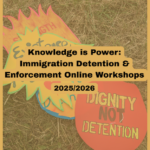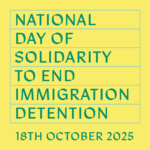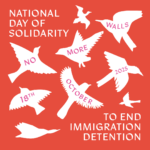Known as Direct Provision, Ireland’s asylum system has faced severe criticism from the United Nations, local political parties, and – most importantly – from those in the system themselves.
Grassroots groups, most notably the Movement of Asylum Seekers in Ireland (MASI), have been campaigning for change for years. They take aim at the lengthy waiting periods, the use of shared rooms, and lack of fundamental rights concerning education and work. Ultimately, they call for the entire system to be shut down.

The total ban on the right to work made Ireland one of the only EU countries to do so. Like the UK, Ireland has often opted out of EU directives on asylum, which are intended to ensure minimum reception standards among EU states. The UK removed the right to work for people seeking asylum in 2002. A House of Commons briefing paper noted in 2016 that “For more than a decade, the UK’s policies to restrict asylum seekers’ rights to work in the UK have attracted criticism from NGOs, trade unions, churches and some Parliamentarians, amongst others.”
Change
Last year, a Rohingya man won a legal challenge against the ban in the Irish Supreme Court. He had been living in the centres for eight years before being recognised as a refugee. The court ruled unanimously that the the “absolute prohibition” was unconstitutional. Yet it also gave the government some room to manoever, as it “acknowledged that significant distinction between nationals and third country nationals in the field of employment are justified.”
Following the judgement, the government introduced a right to work that was so restrictive as to be meaningless. Conditions include a starting salary of over €30k, that no Irish or EU national could be found to take the job, and £1000 application fee (for people on weekly allowance of c.£20). Similarly to the UK’s ‘shortage occupation list’, most professions were restricted.
The barriers, significant even for those not in institutionalised living, meant that not one person was able to make a successful application for a work permit. (The right for self-employment was more accessible, and over 500 people have now accessed it.)
New policy
Last month, the government announced there would be change. Yet despite early morning reports in the Irish Times that the restrictions would be lifted, it emerged at a later press conference (and in subsequence guidance) that while many of the restrictions would be lifted, some crucial ones would remain.
The Good
The new measures mean that virtually all jobs are open, with limited exceptions (such as the police force). There is to be no minimum salary, no registration fee, and employers will not have to advertise to Irish/EU nationals first.
People will have same employment rights and entitlements as Irish nationals. Those in work will also be able to apply for in-work benefits, and will keep their asylum support payment for 12 weeks after starting a new job. Children will not be adversely affected and will not have their daily allowance reduced. The new scheme also provides for access to vocational training for asylum seekers. People under 18 will be able to work, in line with the national rules.
It is estimated some 3,000 people seeking asylum now enjoy the right to work in Ireland. (There are approximately 5,000 people living in Direct Provision).
The Bad
The new system means that people will have to be waiting for nine months for an initial decision on their asylum claim in order be eligible. Given that the average waiting time for such an interview alone is 19 months, many people will be eligible. People who already have work permission will keep it during any appeals. After the final decision, people will not be eligible to work.
If someone doesn’t have right to work by the time you appeal, they won’t be able to apply. In practice, many people living in Direct Provision (who have not had a final decision, but are on appeals), will be not be allowed to work. That means that many of those who have suffered the longest in the centres, and who campaigned for this right, will themselves not be able to access it. This is especially stark given that over 90% of asylum applications are refused in the first instance.
The work permission will be on six months rolling applications, and this could make it hard to apply for and keep jobs. Delays in processing renewals may mean that people lose jobs (as happens with other visas). A recent case in the UK shows how short-term work visas (in this case asylum related) can lead to people losing their jobs.
After a period in employment, people will have to start to pay either all or a portion of their living costs in Direct Provision. Guidance states that “The amount of the contribution will be capped at the cost to the State of providing the accommodation.” These costs – €238 a week – are massively inflated and a huge source of income of those private companies that run the centres.
Other barriers include not being able to access drivers licenses or bank accounts.
What next?
So while this indeed a huge step forward, many of those already in the system won’t be eligible. The new rules will be of most benefit of those from now on.
MASI have said that their Right To Work campaign “will keep going until we have achieved what we set out to achieve – the immediate, unrestricted right to work with full supports and rights for all people in the asylum system in this country.”
In a statement, they ‘welcomed’ the the new rules:
“As the people who have been directly affected by the Irish state’s total ban on employment for people seeking asylum, in the Direct Provision centres across the country people are this evening celebrating what is for once a positive move for at least some of our people.”
Yet, noting the remaining restrictions they said ”We have mixed feelings then: for some of us, today’s announcement opens up the possibility of a normal, dignified life as we wait for a decision; for others, this possibility is still denied without any good reason.”
“When governments grant people basic human rights, they do so with the expectation of gratitude. Today, our gratitude turns more to the brave Rohingya man who took his case contesting the ban on the right to work to the Supreme Court and who by his actions paved the way to today’s announcement on the right to work.















Discussion: